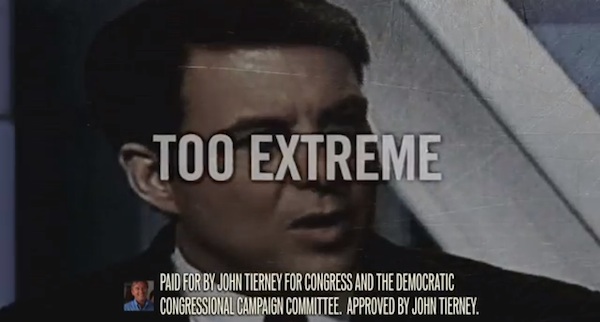The State GOP Better Hope the National Party Gets It Together

Screenshot of a John Tierney ad via YouTube
Though Massachusetts Republicans took pains to differentiate themselves from national Republicans during the 2012 campaign, the state and national GOPers are now having a shockingly similar (if patently obvious) conversation: they need to find a way to get more voters to consider their candidates. On the national scene, this is probably best crystalized by a Los Angeles Times headline, “The end of the world as straight white males know it.” Tuesday’s election put President Obama back in office and strengthened Democratic makeup in the Senate, and numbers suggest these victories stem from an electorate that doesn’t look like it used to. The LA Times notes that though exit polls revealed that Obama earned even less support from white voters than he did in 2008, he won because he retained or increased his support among minority voters, who made up a significantly larger share of the electorate this time around. From the Times:
The result turned out to be an unbeatable combination: virtually universal support from black voters, who turned out as strongly as in 2008, plus decisive backing from members of the younger and fast-growing Latino and Asian American communities.
If those demographic groups continue to make up a significant share of the electorate, and continue to be largely turned off by the Republican brand, that’s bad news (for Republicans.)
There’s always discussion after a political party loses an election about whether to blame moderates and move toward the extremes, or whether to blame the extremes, and shift policies toward the center. The Globe’s Juliette Kayyem is among those suggesting that if the Republicans want their national appeal to survive, they should choose the latter by abandoning a hard line on issues like immigration that turn off Hispanic voters.
Meanwhile, the Massachusetts Republican Party is probably hoping fervently that national Republicans take this kind of advice. The state GOP’s best hopes for victory, Senator Scott Brown and Congressional candidate Richard Tisei, spent much of their campaigns running away from the national platform. It was only because the race was so important to the goal of Republican Senate control that the national party could sit quietly while Scott Brown said in debates that he might not vote for Senate majority leader Mitch McConnell, or while he ran the last week of his campaign under the slogan “Vote the Person. Not the Party.” It doesn’t reveal much pride in his political affiliation. Meanwhile, both he and Richard Tisei lost in part because their opponents spent the campaign hanging them from their party’s platform. The likable Tisei was moderate enough to earn the Boston Globe’s endorsement, but not moderate enough to overcome Tierney’s onslaught of ads that featured the positions of the House Republicans as a whole.
Stonehill College political science professor Peter Ubertaccio tells the (despondent) Boston Herald: “If [state Republicans] want to get by winning the occasional race, what they’re doing at the moment is probably sufficient.” If they want more than that, Republican strategist Todd Domke tells the paper, “The party has to do real outreach to blacks and Hispanics and single women, young people and others if it is going to be taken seriously as an alternative to the Democratic monopoly.”
This week proved though that even if the state GOP works hard and shifts positions to appeal to those groups, it’ll be tough for their candidates to escape the shadow of a national party that hasn’t done the same. If there’s going to be any kind of two party competition in Massachusetts, the national Republicans are going to have to do some soul searching.


